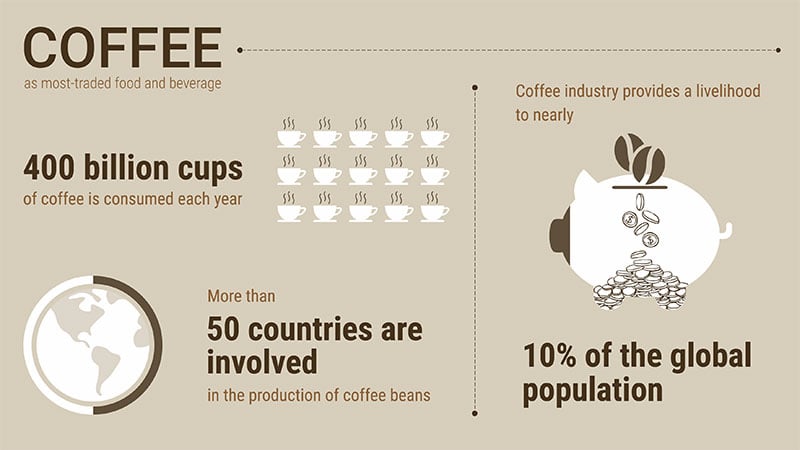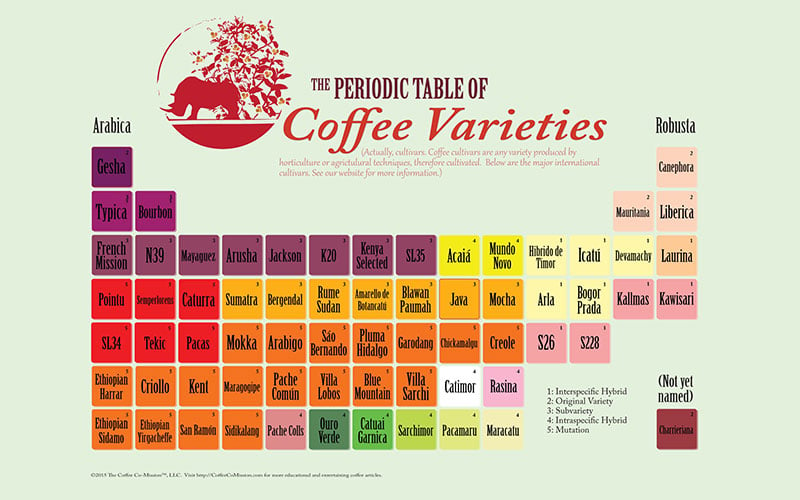Listen here:
As one of the most-traded food and beverage commodities in the world by volume, coffee is a popular choice of beverage for millions of people, resulting in the consumption of close to 400 billion cups each year. More than 50 countries are involved in the production of coffee beans, and estimates show that the coffee industry provides a livelihood to nearly 10% of the global population, or up to 800 million people, at different levels of production and distribution.

With four main species — Arabica, Robusta, Excelsa, and Liberica — and dozens of coffee varieties and cultivars, this commodity is also used as a key ingredient in chocolates, cosmetics and beauty products, fragrances, and, surprisingly, art, furniture, and jewelry too!
Although much in demand for its unmatched flavor, the production of coffee is riddled with numerous challenges, predominantly due to the plant’s sensitivity to weather fluctuations. Rising temperatures and unpredictable rainfall as a result of climate change pose an immense threat to the coffee plant’s yield and, to a great extent, the quality of the harvested beans.
Arabica, in particular, requires a cooler climate, and the global rise in temperature is altering the coffee plant’s growth in terms of its ability to flower and bear fruit and is also contributing to an increase in pests that earlier couldn’t thrive in cold conditions. The changing climatic conditions have also negatively impacted soil fertility, so much so that it might lead to a 10-20% decline in overall crop yields by 2050, according to the Intergovernmental Panel on Climate Change (IPCC).

Source: Coffee Co-Mission
To combat these and numerous supply chain challenges, the coffee industry is now turning to technological advancements and investing in modern digital tools to produce the finest quality coffee beans for every type of product. With even the smallest shift in climatic conditions affecting the cultivation of coffee and consequently the price of coffee beans, the digitalization of the coffee supply chain plays a critical role in identifying various points where the different actors in the industry can leverage technology to add value to the final product in the most effective way possible.
Creating A Digital Footprint For Every Bean
There is an abundance of big data at the different levels of crop production, which is today being leveraged by a myriad of agri-tech solutions to transform the industry into one that is well-performing, scientific, and predictable. Tech-based agricultural innovations today allow coffee growers to capture these critical data points to not only digitalize the process of planning and monitoring every stage of coffee cultivation but also to identify problem areas and mitigate risks effectively.
Cropin’s state-of-the-art farm management solution SmartFarm empowers agri-focused organizations to engage with the different players in their ecosystem on a single platform. The digitalization of farming operations empowers the organization to leverage advanced technologies to drive its initiatives around compliance, predictability, sustainability, and traceability.
Coffee farmers in all developing nations are primarily smallholder farmers, who engage with large agribusinesses and buyers. Implementing a comprehensive system that brings these farmers into the fold of digitization ensures that there is increased transparency and visibility over the entire process from farm to shelf.
- Creating digital profiles of farmers along with their crop variety and geo-tagged farm location ensures accountability and end-to-end traceability.
- Farm area audit provides an accurate measure of acreage and near-accurate yield estimation, in addition to the sowing information facilitating prudent and optimized use of natural resources and agrochemicals.
- Farm data can be captured per plant or per unit of area for more accurate crop monitoring through multiple harvests.
- Planning and managing farm activities, including providing guidelines for best farm practices, is made more efficient for increased agricultural productivity.
- Daily tasks are scheduled for field supervisors based on pre-configured plans for completion of recommended practices on time.
- Three-day weather forecasts allow growers to schedule farm activities in a way that they make efficient use of resources and prevent excessive crop loss.
- Crop monitoring based on both data inputs and images enables remotely-located agronomists to provide quick remedial actions for pests and diseases.
- Financial transactions can be made directly to the growers’ bank accounts while also recording them in farmer ledgers, thus making payments transparent and traceable.
- Growers can also be pre-financed before the start of the season to enable the purchase of seeds, agri-inputs, farm tools, etc., which can be adjusted against the harvest value.
While on one hand SmartFarm empowers key actors in the organization to monitor risks and make proactive, planned, and responsive decisions on the go with its smart, actionable insights on an interactive dashboard, it also enables farm managers to keep track of which farmer is in need of what advice when.
A major challenge unique to the cultivation of coffee and other plantation crops is that unlike seasonal ones such as maize, paddy, or most vegetables, these are perennial crops that need year-round attention. Coffee fruits of the same plant could ripen at different times, which means that farmers need to scour the farm every once in a few days to pick the cherries that are just ripe. Picking unripe or overripe cherries can severely impact the flavor of the coffee, and even one of them in a sample could result in a considerable loss to the coffee producers.
Cropin’s platform enables the farm managers to have a clear picture of the farm’s condition and provide timely advice and adequate know-how to farmers, based on the crop’s health and predictive information on harvest date, quantity, and quality of the harvest. The growers are thus able to receive timely and personalized advice for their respective crops on the package of practices (agri-input plans, intercropping, etc.) as well as smart weather and crop advisories, which helps them make farming more climate-smart, sustainable and rewarding.
In addition, SmartRisk, Cropin’s AI/ML-powered decision intelligence solution provides satellite-imagery-based analytics to regularly monitor crop performance at a regional level. The future-proof application predicts the expected crop stage based on sowing timelines and weather conditions and helps understand crop health and failure patterns based on the historical and current performance of the farm plot.
This future-ready farming solution facilitates coffee farmers to manage and monitor crops in a more accurate, affordable, and scalable manner with the help of structured data aggregation and predictive and prescriptive intelligence delivered to individual growers.
Optimizing Post-Harvest Production For A Perfect Brew
Cropin empowers coffee traders to bring about efficiency in the supply chain by providing an end-to-end solution to manage both pre- and post-harvest activities.
Once the coffee beans have been processed and packed for export or distribution, Cropin’s SmartWare® enables streamlined operations within a warehouse to strengthen the link between growers and the rest of the supply chain. The application facilitates efficient management of packhouse processes with its flexible inventory management and SKU tagging, thus cutting down the number of hours spent in manual labor and significantly increasing productivity.
SmartWare also optimizes order fulfillment and helps in better marketability of the produce with Cropin’s farm-to-fork traceability feature, which places a unique QR code on the product’s label. Consumers around the globe can scan the QR code to trace the origins of the coffee product back to the farm where it was cultivated. They can also learn other details pertaining to its journey from cherry to bean to the product in hand. This transparency in production processes also guarantees conscious buyers that the coffee has been ethically and sustainably sourced, with minimum or no impact on the ecosystem.
Cropin’s end-to-end traceability also allows farming and food processing companies to secure quality and compliance certifications such as Fair Trade, Rainforest Alliance, and USDA Organic, which facilitates hassle-free exports to international markets. This particularly carries a lot of weight for producers who cultivate a specific variety of coffee or produce specialty coffee and helps fetch a premium price for the growers. In addition, suppliers can rely on the digital record of the entire production and distribution history, to identify the exact source of the problem in the supply chain and react quickly to significantly reduce losses and prevent any blow to the brand value.
Establishing Bean-to-Cup Traceability: Cropin's Success Stories
The traceability feature for the coffee supply chain can be best demonstrated through Cropin’s collaboration with an importer of specialty coffee from different parts of South America, Central America and Mexico, Africa, and Southeast Asia. Through an approach called “Relationship Coffee”, the organization focuses on establishing transparent relationships between coffee growers and buyers to ensure the best value for the produce.
A significant number of growers across this organization's areas of operation are women who provide coffee beans to some of the well-known roasted coffee brands such as Starbucks, Peet’s, Strauss, Green Mountain, and various other brands that take a keen interest in their empowerment and adhere to responsible and verified sourcing through innovative partnerships.
The organization leveraged Cropin’s platform to ascertain the origin of coffee marked as cultivated by women, by recording the details of individual growers and allowing end-users to trace this information back from the package’s label and realize the impact that women communities have on the coffee industry. This not only ensures gender equality in coffee-growing communities of developing markets but also provides better livelihoods to these small-scale women farmers who grow and process their own coffee.
Yet another interesting use case for Cropin’s traceability feature can be exemplified by the partnership with a Netherlands-based specialty coffee company. The company is the first “FairChain” coffee that ensures a fairer coffee supply chain and better livelihoods for coffee growers in Ethiopia by both sourcing and roasting coffee beans within the country. Processing coffee locally also preserves the special flavors right at the source and adds more value and character to the end product.
The objective behind FairChain is to eliminate middlemen from the supply chain and make sure that the farmers they work closely with receive the best value for the high-quality coffee beans they produce. Cropin’s leading-edge agritech solutions empower the organization’s field team to guide the farmers in the adoption of the best farming practices. Cropin’s platform also enables the company to provide adequate support to women farmers and bring about bean-to-cup traceability for an increased premium for the smallholder farmers.






